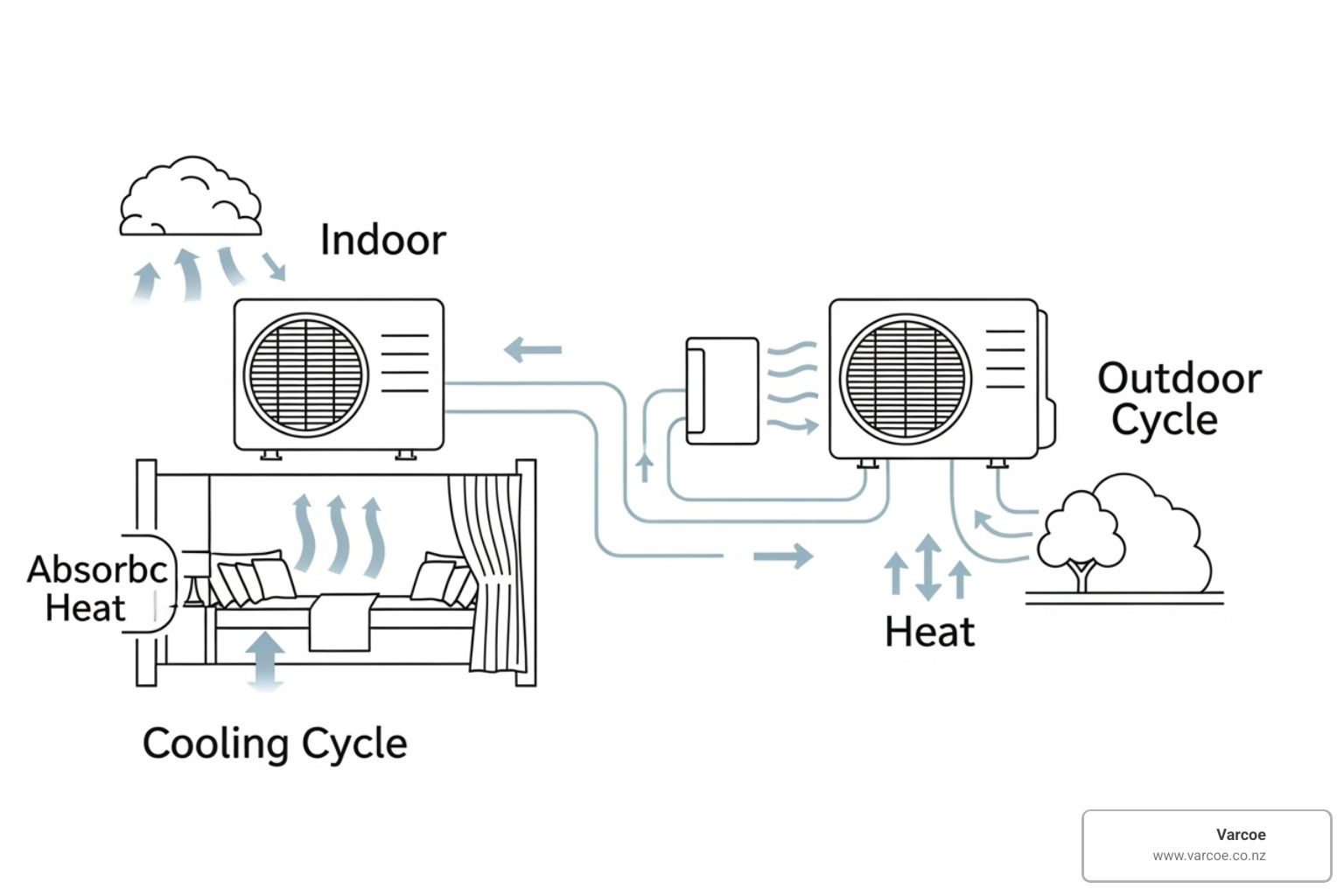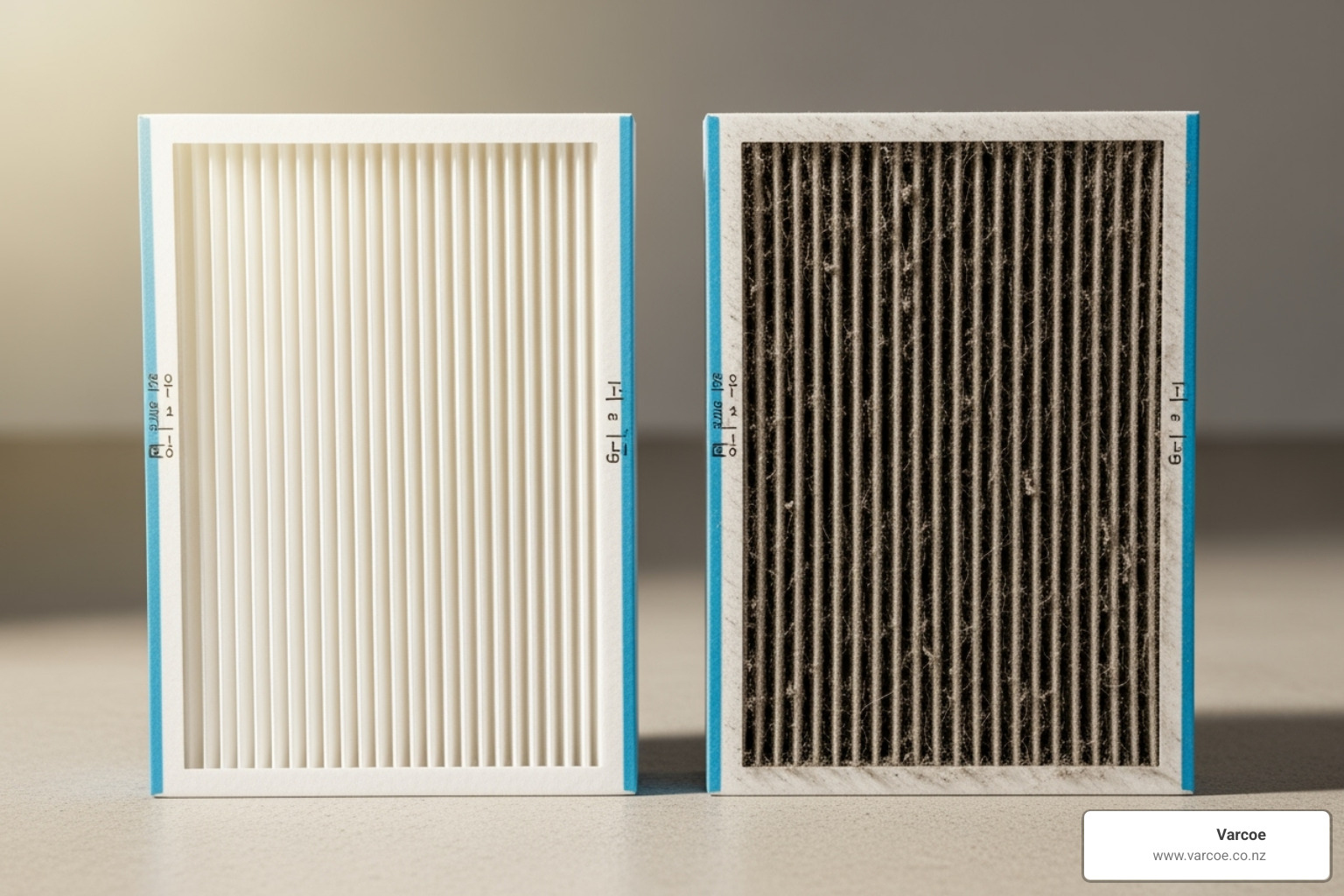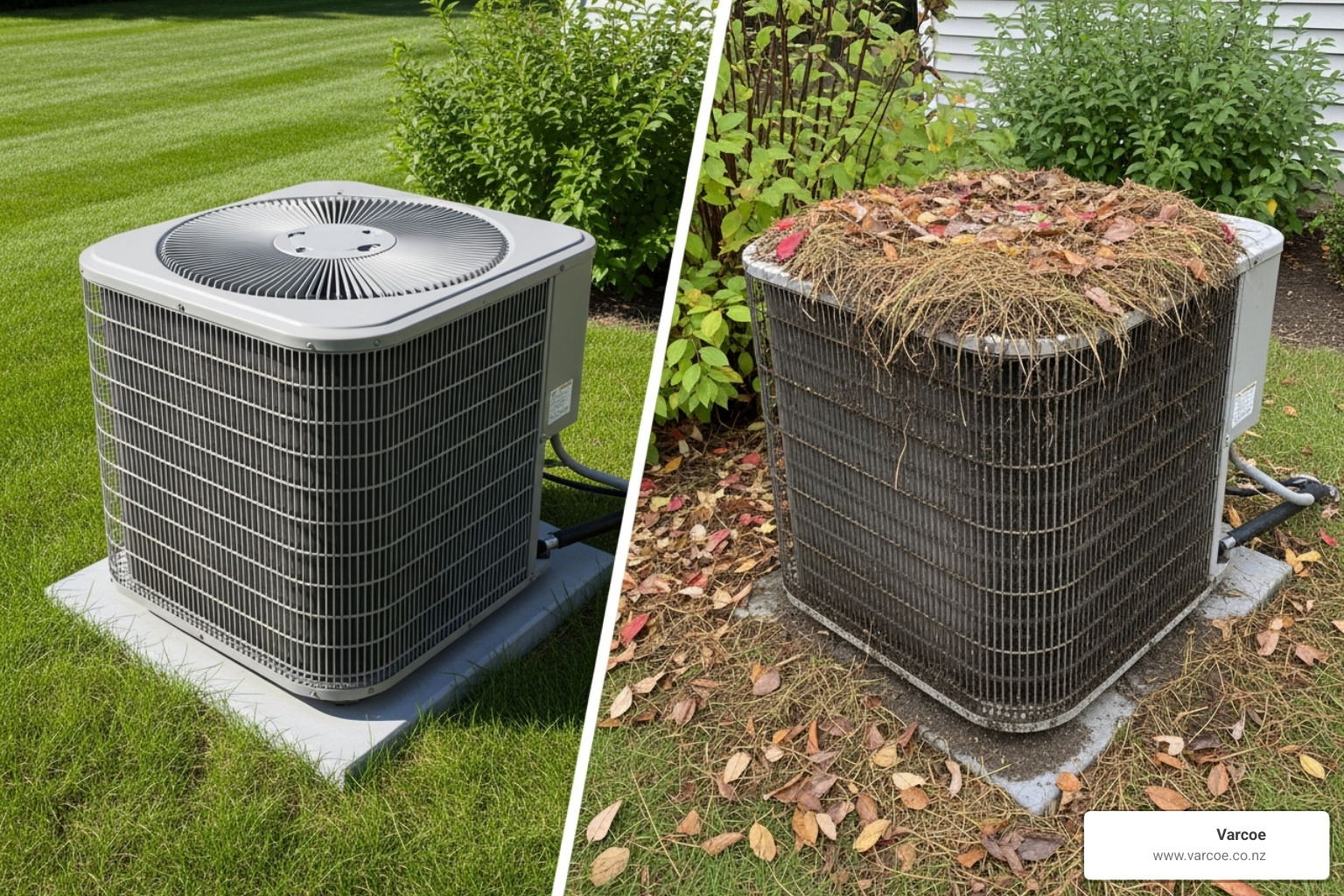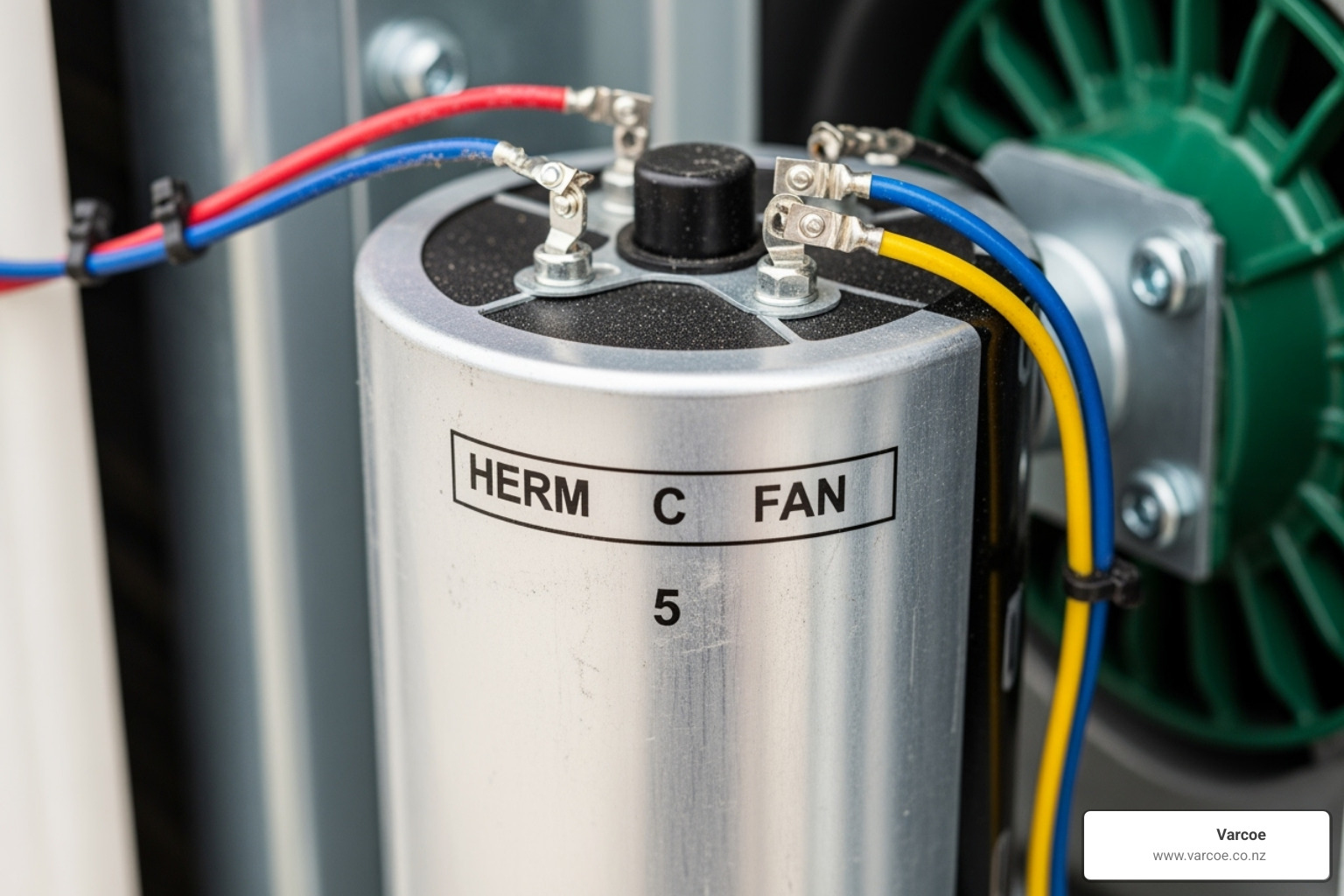Is Your Air Conditioner on Strike? How to Get it Cooling Again
Why Your Cool Comfort Has Vanished
When your air conditioner not working becomes the reality on a sweltering Auckland day, you’re not alone. Most New Zealand homes rely on air conditioning, and with systems lasting 15 to 20 years, breakdowns are inevitable.
Quick Diagnosis Checklist for AC Not Working:
- Check thermostat – Set to ‘cool’ and temperature below room temp
- Inspect circuit breaker – Reset if tripped
- Examine air filter – Replace if dirty or clogged
- Clear outdoor unit – Remove debris, grass, leaves
- Look for ice – Turn off unit if evaporator coil is frozen
- Check vents – Ensure all are open and unblocked
The good news is that many AC problems have simple solutions you can tackle yourself in 15 minutes. This guide will help you distinguish between quick DIY fixes and issues needing professional attention. You’ll learn to spot the difference between a dirty filter (an easy fix) and a failing compressor (call the experts), as some problems can worsen if ignored.

Understanding how your AC removes heat from your home helps identify where things can go wrong in the cooling process.
First Response: Simple Checks You Can Do in 15 Minutes
Before panicking about repair bills, know that many common AC problems have simple solutions you can do yourself in 15 minutes. These quick checks can reveal the culprit and may save you a service call.
First, check your thermostat settings. It’s a common mistake to have it on ‘heat’ or set to a temperature higher than the room. Ensure it’s on ‘cool’ mode with the temperature set a few degrees below the current room temperature. Also, check if the fan is on ‘auto’ instead of ‘on’. The ‘on’ setting runs the fan continuously, even without cooling, which can be misleading. If you have a smart thermostat that’s unresponsive, try restarting it.
Next, check the circuit breaker. AC units draw a lot of power and can trip a breaker. Find the one for your AC and reset it. If it trips again immediately, call a professional, as this signals a serious electrical problem. Also, check the outdoor unit power switch near the condenser; it can get switched off accidentally.
Finally, check your vents and registers. Ensure they are open and not blocked by furniture or curtains. Blocked vents reduce efficiency and cause uneven cooling. Closing vents can also damage your system by increasing pressure in the ductwork.
The Dirty Air Filter Dilemma

A dirty air filter is the most common cause of an air conditioner not working. A clogged filter restricts airflow, forcing your AC to work harder. This leads to reduced cooling performance, as less air passes over the evaporator coil to be cooled. Your AC may run constantly while producing lukewarm air, causing your energy bills to increase.
How to check your filter is simple. Most are in the indoor air handler or behind a return vent. Slide it out and hold it to the light. If you can’t see through it, it needs attention.
How to clean or replace depends on the type. Replace disposable filters, and gently wash reusable ones with mild soap and water, letting them dry completely before reinstallation. Ensure the arrows on the filter point in the direction of airflow.
We recommend checking filters monthly and replacing them every three months, or more often in homes with pets or allergies.
Clearing the Outdoor Condenser Unit

The outdoor condenser unit releases heat from your home. When debris blocks the unit, this heat exchange is hampered, and your air conditioner not working efficiently is the result. The role of the condenser is to transfer heat from the refrigerant to the outside air. Grass clippings, leaves, and dirt on the coils act like insulation, trapping heat.
This debris blockage makes the cooling cycle inefficient, forcing the AC to run longer, increasing energy bills and accelerating wear on components.
For cleaning, first turn off the power at the outdoor switch and your main electrical panel. Remove large debris by hand. For hose safety, use a garden hose on a gentle setting to spray the coils from the top down.
Never use a pressure washer, as it can damage the delicate fins. Maintain at least 60 centimetres of clear space around the unit to ensure it has room to breathe.
Diagnosing Deeper Issues When Your Air Conditioner is Not Working
If the simple checks didn’t solve your air conditioner not working problem, it’s time to look at deeper issues. AC systems are complex, and one failing part can cause a domino effect. Some problems are clear signals to call a professional.
Here’s what we often find when homeowners call us about persistent cooling problems:
| Symptom | Potential Cause | DIY or Professional Fix |
|---|---|---|
| AC running but not cooling | Dirty filter, frozen coil, low refrigerant, dirty condenser, faulty compressor | DIY: Check filter and condenser. Professional: Refrigerant issues, compressor problems |
| AC won’t turn on at all | Tripped breaker, thermostat problems, failed capacitor, clogged drain triggering safety switch | DIY: Reset breaker, check thermostat. Professional: Electrical component replacement |
| Strange noises from unit | Failing fan motor, compressor issues, loose parts, refrigerant leak hissing | Professional diagnosis and repair needed |
| Water leaking inside | Clogged drain line, frozen coil, cracked drain pan | DIY: Clear simple drain blockages. Professional: Persistent leaks and underlying causes |
| Blowing warm or hot air | Low refrigerant, dirty condenser coils, compressor failure, heat pump valve issues | Professional repair required |
Airflow and Drainage Problems
Airflow and drainage issues are common culprits when an air conditioner not working properly.
Frozen evaporator coils are a frequent problem. Signs include ice on copper lines near the indoor unit, water dripping, or weak airflow from vents. This is usually caused by restricted airflow (from a dirty filter) or low refrigerant levels. If you see ice, turn the AC off immediately to prevent water damage and switch the thermostat to ‘Fan Only’ to help it melt. Do not scrape the ice off, as this can damage the coils. Thawing can take up to 24 hours.
Clogged drain lines can also shut down your system. As your AC removes humidity, the water collects in a drain pan and flows out. This line can get blocked with algae or debris. Signs include water pooling near the indoor unit or the AC shutting off completely. Most modern units have a float switch that shuts the system off to prevent water damage when the pan is full.
What electrical problems cause an air conditioner not working?

Electrical problems can cause erratic behaviour or a complete shutdown and require a professional for safety.
The capacitor is a common failure point. It provides the startup boost for the compressor and fan motors. A failing capacitor might cause the outdoor unit to hum without the fan spinning, or the unit may struggle or fail to start. Capacitors store high voltage and are not a DIY replacement.
Fan motor problems can also stop your unit from cooling. If the outdoor fan motor fails, the unit can’t dissipate heat, causing the compressor to overheat and shut down.
Contactors act as switches controlling power to the motors. If they become damaged, your outdoor unit may not start at all.
Refrigerant Leaks and Compressor Failure
Refrigerant and compressor issues are serious problems that require professional expertise.
Refrigerant is the fluid that enables cooling by absorbing and releasing heat. A refrigerant leak means your system can’t cool effectively. Signs include hissing sounds, oily residue on coils, or declining cooling performance. Low refrigerant can also cause the evaporator coil to freeze and damage the compressor. Due to environmental and health risks, leaks must be handled by a certified professional.
Compressor failure is a major and expensive problem. The compressor is the heart of the AC, circulating refrigerant. When it fails, you get no cooling. Warning signs include loud grinding or clanking noises, the AC tripping the circuit breaker immediately, the outdoor unit shaking violently, or no cool air when the fan is running. A failed compressor is a major repair, and for older systems, replacement might be more economical. Our experience can help you decide between repair and replacement.
Prevention and Professional Help: Keeping Your AC Healthy
Understanding why your air conditioner not working occurs is the first step. Now, let’s focus on prevention and knowing when to call for professional help.
My air conditioner is running but not cooling, what is wrong?
This is a frustratingly common complaint. If your AC is running but not cooling, the cause could be a refrigerant leak, frozen evaporator coil, dirty condenser coil, or a failing compressor. Don’t forget the basics like a dirty air filter or blocked vents, which can also severely restrict airflow.
Other potential issues include:
- Incorrect AC Size: An undersized unit will run constantly without ever cooling your home properly, while an oversized unit will cycle on and off too frequently, failing to control humidity.
- Ductwork Issues: Leaks, disconnections, or poor insulation in your ductwork mean cool air escapes before reaching your rooms. This leads to weak airflow, uneven cooling, and high energy bills.
Continuing to run a faulty unit puts stress on the compressor, increases energy use, and can turn a minor repair into a major replacement.
The Value of Regular Maintenance
Like a car, your AC needs regular servicing. A well-maintained system is more efficient, lasts longer, and is more reliable.
Annual tune-ups, ideally in spring, are key. A professional service includes checking refrigerant levels, cleaning coils, inspecting electrical components, cleaning the drain line, and more. The benefits are clear: improved efficiency (lower bills), extended lifespan (catching problems early), better air quality, and reliability during a heatwave.
When to Call a Professional Technician
While DIY checks are useful, some problems require a professional. Call an expert for:
- Refrigerant Issues: Leaks require licensed technicians and special tools.
- Electrical Problems: Beyond resetting a breaker, electrical work is dangerous and should be left to professionals.
- Compressor Failure: This major repair needs professional diagnosis.
- Persistent Problems: If DIY checks don’t work, it’s time for an expert.
- Unusual Noises or Smells: Grinding, hissing, or burning smells are red flags.
- Water Leaks: If not from a simple drain clog, a leak could signal a more serious issue.
Frequently Asked Questions about AC Problems
Why is my heat pump not cooling?
In New Zealand, a “heat pump” is the same as an air conditioner, with the ability to both heat and cool. If it’s not cooling, the causes are often the same as for a standard AC.
First, check your thermostat is on ‘cool’ mode and set to a temperature below the current room temperature. Also check for a dirty air filter, blocked outdoor unit, refrigerant leaks, or a frozen evaporator coil.
A problem unique to heat pumps is a faulty reversing valve. This component switches between heating and cooling. If it’s stuck, your unit might only heat. This requires a professional repair. Electrical problems or error codes (flashing lights) also point to issues that may need an expert diagnosis.
What are the signs my AC compressor has failed?
Compressor failure is one of the most serious and expensive AC repairs. The key signs are:
- Loud grinding or clanking noises: This indicates severe internal damage. Turn the unit off immediately and call a professional.
- AC trips the breaker immediately: A failing compressor draws too much power, tripping the breaker as a safety measure.
- Outdoor unit shakes violently: This suggests an internal imbalance or damage.
- No cool air despite the fan running: If the indoor fan blows but the air isn’t cold, the compressor may have failed.
Can a clogged drain line cause my AC to stop cooling?
Yes. A clogged drain line won’t stop the cooling process directly, but it will trigger a safety mechanism that shuts down the entire system.
As your AC removes humidity, water collects in a drain pan and flows out. If the drain line clogs, water backs up in the pan. A float switch detects the high water level and shuts off the AC to prevent flooding and water damage. This is why you might see water pooling near your indoor unit when the AC stops working. Clearing the blockage will allow the system to restart, but if the problem persists, call a professional.
Get Your Cool Back: Next Steps
When your air conditioner not working leaves you in the Auckland heat, it’s good to know where to start. This guide helps you tackle simple issues and recognise when to call for help.
Always start with the basics: check your thermostat, air filter, and outdoor unit. These 15-minute checks often solve the problem. However, know your limits. Refrigerant leaks, electrical faults, and compressor failures are jobs for professionals. Attempting complex repairs yourself can be dangerous and costly.
Recognising warning signs like hissing, grinding noises, or water leaks early can save you money and discomfort. If DIY fixes don’t work, a professional diagnosis is essential.
With over 50 years of experience serving Auckland, Varcoe has seen it all. We understand the local climate and housing challenges, offering expert solutions, not just quick fixes. From a heat pump stuck on heat to a completely dead AC, we’re here to restore your comfort efficiently.
Don’t sweat it out. Contact us for expert air conditioning servicing and let’s get your cool back.
